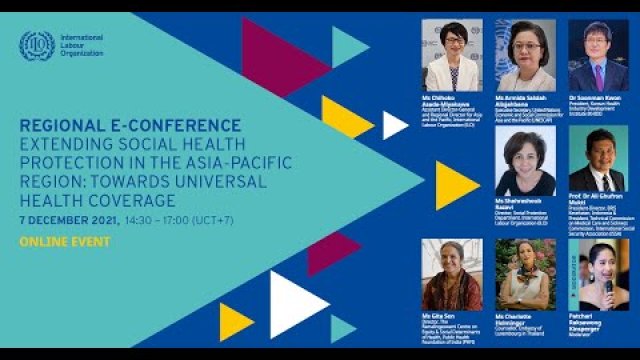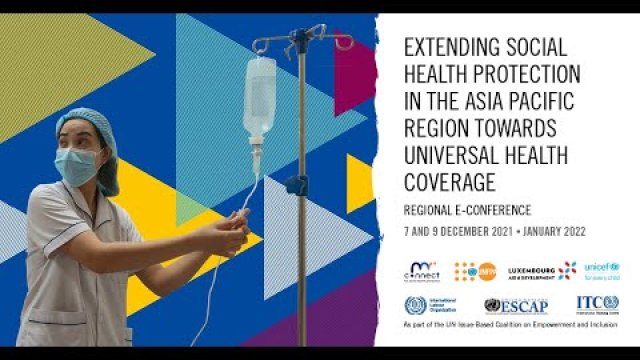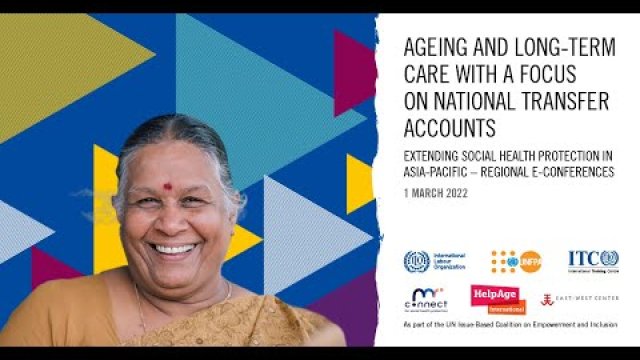EXTENDING SOCIAL HEALTH PROTECTION IN THE ASIA-PACIFIC REGION: TOWARDS UNIVERSAL HEALTH COVERAGE

EXTENDING SOCIAL HEALTH PROTECTION IN THE ASIA-PACIFIC REGION: TOWARDS UNIVERSAL HEALTH COVERAGE
REGIONAL E-CONFERENCE
7 AND 9 DECEMBER 2021 | 1 March 2022
Content and objectives of the E-conference
Some of the most rapidly ageing populations in the world can be found in Asia and the Pacific region, causing a shift in the narrative of the region's growth prospects. Many countries are unprepared for how ageing affects society, including increasing health and social care expenditures and a decline in working-age populations.
A more comprehensive lifecycle approach to population ageing that emphasizes the sequential events and developmental steps throughout a person's life is a practical policy option based on scientific evidence. Promoting a lifecycle approach to population ageing should be based on demographic data to inform macro-level policy dialogue and programme development, involving multiple stakeholders.
Analyses of National Transfer Accounts (NTA) in this context are helpful to apply policy estimation and development in macro-level policy dialogue. The NTA provides a unique and invaluable framework for investigating how changes in population age structure influence national development, economic and social security, generational equity, gender equality, public finances, and many other important public policy issues.
This e-conference aims at introducing the generational economy perspective using National Transfer Account evidence to support the engagement of policy planners on addressing demographic diversity and dividends, gender and population ageing in the region.
Why a knowledge-sharing event on social health protection in the Asia and Pacific region?
Over the past decades, many countries in Asia and the Pacific have rapidly expanded social health protection coverage. Despite laudable progress, the effective realization of the human rights to health and social security is not yet a reality for all. Inequalities in coverage and in access to healthcare services still exist across and within countries.
Amidst the on-going Covid-19 pandemic, social demand for adequate social health protection systems is high globally, and the Asia Pacific region is not an exception. In addition, some of the most rapidly ageing populations in the world can be found in Asia and the Pacific region, causing a shift in the narrative of the region’s growth prospects.
Population growth and changing demographics influence economic growth, the global burden of disease, gender and generational equity, public finances, social and human capital development. Many countries have been unprepared for how ageing affects society, including the increase in health and social care expenditure and a decline in the relative share of working-age populations. For these reasons, the financial sustainability of healthcare, long-term care, pensions and other income security programmes needs to be considered.
The Issue-Based Coalition (IBC) on Empowerment and Inclusion (composed of FAO, ILO, OHCHR, UNAIDS, UNDRR, UNESCAP, UNESCO, UNICEF, UNFPA UNHCR, UNV and WFP) in partnership with CONNECT - a pioneering multi-stakeholder network of public and private institutions and non-for-profit organizations in the Asia Pacific region, working together to bridge the gaps in Social Health Protection, is therefore organizing a regional conference documenting strategies and progress made towards the extension of Social Health Protection in the Asia Pacific Region.
What are the objectives?
The event aims to foster exchanges and promote mutual learning among countries in the Asia Pacific region and beyond, on strategies, progress and remaining challenges on the extension of social health protection.
Specific objectives include:
- Exchange experiences among countries in the Asia Pacific region and beyond on strategies and paths towards extension of social health protection
- Enhance knowledge and awareness among policy makers in Asia-Pacific member States on options to move towards universal health coverage.
- Launch the ILO regional publication on extension of social health protection in Asia Pacific.
- Introduce the generational economy perspective using National Transfer Account evidence to support engagement of policy planners on addressing demographic diversity and dividends, gender and population ageing in the region
The conference is supported by CONNECT, the regional network on social health protection in Asia, to incite more institutions to join the network as a long-term strategy to foster South-South cooperation.
What will happen?
This knowledge-sharing event combines three online webinars of two and a half hours each. Between the webinars, a common workspace will be available for participants to place comments, share ideas, and have access to relevant documents and useful links.
- 7 December 2021: Live webinar 1: Social Health Protection: where are we in the Asia Pacific region? Launch of the ILO regional compendium [high-level segment]
- 9 December 2021: Live webinar 2: Strategies to sustainably expand coverage and adequacy of protection
- 1 March 2022: Live webinar 3: Ageing and Long-Term Care with a focus on National Transfer Accounts for intergenerational policy advancement
Who will attend?
Speakers:
- Policy makers from the Asia Pacific region
- Academia
- Workers and Employers representatives
- INGOs/NGOs
- UN agencies: Members of the IBC and others institutions
- Other agencies working on health financing.
Audiences:
Decision-makers, practitioners, academics and other interested parties can register through this web page and follow the webinar.
Video recordings
Presentations
- ILO Regional Report_Accelerating progress towards Universal Health Coverage in Asia and the Pacific
- Presentation by Dr Kwon, Dr Soonman Kwon, President, Korean Health Industry Development Institute (KHIDI)
- Presentation by Dr Ying Yazhen, Vice-President, China Health Insurance Research Association (CHIRA)



